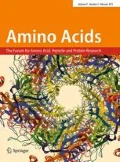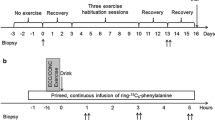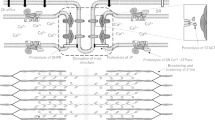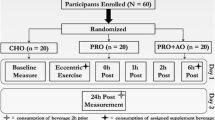Abstract
Unaccustomed high-intensity eccentric exercise (ECC) can provoke muscle damage including several days of muscle force loss. Post-exercise dietary supplementation may provide a strategy to accelerate rate of force regain by affecting mechanisms related to muscle protein turnover. The aim of the current study was to investigate if protein signaling mechanisms involved in muscle protein turnover would be differentially affected by supplementation with either whey protein hydrolysate and carbohydrate (WPH+CHO) versus isocaloric carbohydrate (CHO) after muscle-damaging ECC. Twenty-four young healthy participants received either WPH+CHO (n = 12) or CHO supplements (n = 12) during post-exercise recovery from 150 maximal unilateral eccentric contractions. Prior to, at 3 h and at 24, 48, 96 and/or 168 h post-exercise, muscle strength, muscle soreness, and Akt-mTOR and FOXO signaling proteins, were measured in an ECC exercising leg and in the contralateral non-exercise control leg (CON). After ECC, muscle force decreased by 23–27 % at 24 h post-exercise, which was followed by gradual, although not full recovery at 168 h post-exercise, with no differences between supplement groups. Phosphorylation of mTOR, p70S6K and rpS6 increased and phosphorylation of FOXO1 and FOXO3 decreased in the ECC leg, with no differences between supplement groups. Phosphorylation changes were also observed for rpS6, FOXO1 and FOXO3a in the CON leg, suggesting occurrence of remote tissue effects. In conclusion, divergent dietary supplementation types did not produce differences in signaling for muscle turnover during recovery from muscle-damaging exercise.




Similar content being viewed by others
Refrences
Anthony JC, Anthony TG, Kimball SR, Vary TC, Jefferson LS (2000) Orally administered leucine stimulates protein synthesis in skeletal muscle of post absorptive rats in association with increased eIF4F formation. J Nutr 130:139–145
Atherton PJ, Smith K (2012) Muscle protein synthesis in response to nutrition and exercise. J Physiol 590:1049–1057. doi:10.1113/jphysiol.2011.225003
Bijur PE, Silver W, Gallagher EJ (2001) Reliability of the visual analog scale for measurement of acute pain. Acad Emerg Med 8:1153–1157
Borgenvik M, Apro W, Blomstrand E (2012) Intake of branched-chain amino acids influences the levels of MAFbx mRNA and MuRF-1 total protein in resting and exercising human muscle. Am J Physiol Endocrinol Metab 302:E510–E521. doi:10.1152/ajpendo.00353.2011
Brancaccio P, Lippi G, Maffulli N (2010) Biochemical markers of muscular damage. Clin Chem Lab Med: CCLM/FESCC 48:757–767. doi:10.1515/CCLM.2010.179
Buckley JD, Thomson RL, Coates AM, Howe PR, DeNichilo MO, Rowney MK (2010) Supplementation with a whey protein hydrolysate enhances recovery of muscle force-generating capacity following eccentric exercise. J Sci Med Sport 13:178–181. doi:10.1016/j.jsams.2008.06.007
Churchward-Venne TA et al (2012) Supplementation of a suboptimal protein dose with leucine or essential amino acids: effects on myofibrillar protein synthesis at rest and following resistance exercise in men. J Physiol 590:2751–2765. doi:10.1113/jphysiol.2012.228833
Clarkson PM, Hubal MJ (2002) Exercise-induced muscle damage in humans. Am J Phys Med Rehabil 81:S52–S69. doi:10.1097/01.PHM.0000029772.45258.43
Clarkson PM, Nosaka K, Braun B (1992) Muscle function after exercise-induced muscle damage and rapid adaptation. Med Sci Sports Exerc 24:512–520
Cooke MB, Rybalka E, Stathis CG, Cribb PJ, Hayes A (2010) Whey protein isolate attenuates strength decline after eccentrically-induced muscle damage in healthy individuals. J Int Soc Sports Nutr 7:30. doi:10.1186/1550-2783-7-30
Crameri RM et al (2004) Changes in satellite cells in human skeletal muscle after a single bout of high intensity exercise. J Physiol 558:333–340. doi:10.1113/jphysiol.2004.061846
Crameri RM, Aagaard P, Qvortrup K, Langberg H, Olesen J, Kjaer M (2007) Myofibre damage in human skeletal muscle: effects of electrical stimulation versus voluntary contraction. J Physiol 583:365–380. doi:10.1113/jphysiol.2007.128827
Cuthbertson DJ, Babraj J, Smith K, Wilkes E, Fedele MJ, Esser K, Rennie M (2006) Anabolic signaling and protein synthesis in human skeletal muscle after dynamic shortening or lengthening exercise. Am J Physiol Endocrinol Metab 290:E731–E738. doi:10.1152/ajpendo.00415.2005
Eliasson J, Elfegoun T, Nilsson J, Kohnke R, Ekblom B, Blomstrand E (2006) Maximal lengthening contractions increase p70 S6 kinase phosphorylation in human skeletal muscle in the absence of nutritional supply. Am J Physiol Endocrinol Metab 291:E1197–E1205. doi:10.1152/ajpendo.00141.2006
Farup J, Rahbek SK, Knudsen IS, de Paoli F, Mackey AL, Vissing K (2014) Whey protein supplementation accelerates satellite cell proliferation during recovery from eccentric exercise. Amino Acids 46:2503–2516. doi:10.1007/s00726-014-1810-3
Feasson L, Stockholm D, Freyssenet D, Richard I, Duguez S, Beckmann JS, Denis C (2002) Molecular adaptations of neuromuscular disease-associated proteins in response to eccentric exercise in human skeletal muscle. J Physiol 543:297–306
Fujita S et al (2007) Nutrient signalling in the regulation of human muscle protein synthesis. J Physiol 582:813–823. doi:10.1113/jphysiol.2007.134593
Gannon MC, Nuttall FQ (2010) Amino acid ingestion and glucose metabolism—a review. IUBMB Life 62:660–668. doi:10.1002/iub.375
Gilda JE, Gomes AV (2013) Stain-Free total protein staining is a superior loading control to beta-actin for Western blots. Anal Biochem 440:186–188. doi:10.1016/j.ab.2013.05.027
Gurtler A et al (2013) Stain-Free technology as a normalization tool in Western blot analysis. Anal Biochem 433:105–111. doi:10.1016/j.ab.2012.10.010
Hamilton DL, Baar K (2008) Muscle growth: no IGFs, ands, or buts. J Physiol 586:5–6. doi:10.1113/jphysiol.2007.147660
Hortobagyi T, Houmard J, Fraser D, Dudek R, Lambert J, Tracy J (1998) Normal forces and myofibrillar disruption after repeated eccentric exercise. J Appl Physiol 84:492–498
Howell JN, Chleboun G, Conatser R (1993) Muscle stiffness, strength loss, swelling and soreness following exercise-induced injury in humans. J Physiol 464:183–196
Hyldahl RD, Hubal MJ (2014) Lengthening our perspective: morphological, cellular, and molecular responses to eccentric exercise. Muscle Nerve 49:155–170. doi:10.1002/mus.24077
Jackman SR, Witard OC, Jeukendrup AE, Tipton KD (2010) Branched-chain amino acid ingestion can ameliorate soreness from eccentric exercise. Med Sci Sports Exerc 42:962–970. doi:10.1249/MSS.0b013e3181c1b798
Lueders TN et al (2011) The alpha7beta1-integrin accelerates fiber hypertrophy and myogenesis following a single bout of eccentric exercise. Am J Physiol Cell Physiol 301:C938–C946. doi:10.1152/ajpcell.00515.2010
Moberg M, Apro W, Ohlsson I, Ponten M, Villanueva A, Ekblom B, Blomstrand E (2014) Absence of leucine in an essential amino acid supplement reduces activation of mTORC1 signalling following resistance exercise in young females. Appl Physiol Nutr Metab 39:183–194. doi:10.1139/apnm-2013-0244
Nedergaard A, Vissing K, Overgaard K, Kjaer M, Schjerling P (2007) Expression patterns of atrogenic and ubiquitin proteasome component genes with exercise: effect of different loading patterns and repeated exercise bouts. J Appl Physiol 103:1513–1522. doi:10.1152/japplphysiol.01445.2006
Pasiakos SM, Lieberman HR, McLellan TM (2014) Effects of protein supplements on muscle damage, soreness and recovery of muscle function and physical performance: a systematic review. Sports Med 44:655–670. doi:10.1007/s40279-013-0137-7
Paulsen G et al (2007) Maximal eccentric exercise induces a rapid accumulation of small heat shock proteins on myofibrils and a delayed HSP70 response in humans. Am J Physiol Regul, Integr Comp Physiol 293:R844–R853. doi:10.1152/ajpregu.00677.2006
Rahbek SK, Farup J, Moller AB, Vendelbo MH, Holm L, Jessen N, Vissing K (2014) Effects of divergent resistance exercise contraction mode and dietary supplementation type on anabolic signalling, muscle protein synthesis and muscle hypertrophy. Amino Acids 46:2377–2392. doi:10.1007/s00726-014-1792-1
Reitelseder S et al (2014) Positive muscle protein net balance and differential regulation of atrogene expression after resistance exercise and milk protein supplementation. Eur J Nutr 53:321–333. doi:10.1007/s00394-013-0530-x
Rodgers JT et al (2014) mTORC1 controls the adaptive transition of quiescent stem cells from G0 to G(Alert). Nature 509:393–396. doi:10.1038/nature13255
Sandri M (2008) Signaling in muscle atrophy and hypertrophy. Physiology 23:160–170. doi:10.1152/physiol.00041.2007
Sandri M et al (2004) Foxo transcription factors induce the atrophy-related ubiquitin ligase atrogin-1 and cause skeletal muscle atrophy. Cell 117:399–412
Schiaffino S, Dyar KA, Ciciliot S, Blaauw B, Sandri M (2013) Mechanisms regulating skeletal muscle growth and atrophy. FEBS J 280:4294–4314. doi:10.1111/febs.12253
Stefanetti RJ et al (2014) Influence of divergent exercise contraction mode and whey protein supplementation on atrogin-1, MuRF1 and FOXO1/3A in human skeletal muscle. J Appl Physiol. doi:10.1152/japplphysiol.00136.2013
Stitt TN et al (2004) The IGF-1/PI3 K/Akt pathway prevents expression of muscle atrophy-induced ubiquitin ligases by inhibiting FOXO transcription factors. Mol Cell 14:395–403
Vissing K, Andersen JL, Schjerling P (2005) Are exercise-induced genes induced by exercise? FASEB J 19:94–96. doi:10.1096/fj.04-2084fje
Vissing K, Overgaard K, Nedergaard A, Fredsted A, Schjerling P (2008) Effects of concentric and repeated eccentric exercise on muscle damage and calpain-calpastatin gene expression in human skeletal muscle. Eur J Appl Physiol 103:323–332. doi:10.1007/s00421-008-0709-7
Vissing K et al (2013) Effect of resistance exercise contraction mode and protein supplementation on members of the STARS signalling pathway. J Physiol 591:3749–3763. doi:10.1113/jphysiol.2012.249755
Wojcik JR, Walber-Rankin J, Smith LL, Gwazdauskas FC (2001) Comparison of carbohydrate and milk-based beverages on muscle damage and glycogen following exercise. Int J Sport Nutr Exerc Metab 11:406–419
Acknowledgments
We thank the participants for their participation in the project. Gitte Kaiser Hartvigsen, and Janni Mosgaard Jensen (Section of Sport Science, Department of Public Health, Aarhus University, Denmark) are thanked for technical assistance.
Conflict of interest
The authors declare that they have no conflict of interest.
Ethical standard
All participants were informed about the purpose and the risks related to the study and gave written, informed consent to participate. The study was approved by The Central Denmark Region Committees on Health Research Ethics (ref. no. M-20110179) and performed in accordance with the Declaration of Helsinki.
Author information
Authors and Affiliations
Corresponding author
Additional information
Handling Editor: E. Rawson.
Rights and permissions
About this article
Cite this article
Rahbek, S.K., Farup, J., de Paoli, F. et al. No differential effects of divergent isocaloric supplements on signaling for muscle protein turnover during recovery from muscle-damaging eccentric exercise. Amino Acids 47, 767–778 (2015). https://doi.org/10.1007/s00726-014-1907-8
Received:
Accepted:
Published:
Issue Date:
DOI: https://doi.org/10.1007/s00726-014-1907-8




